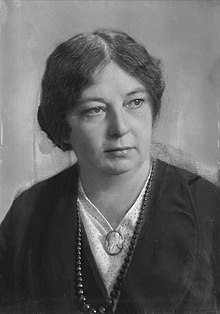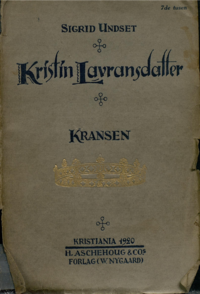1928 Nobel Prize in Literature
| Sigrid Undset | |
 "principally for her powerful descriptions of Northern life during the Middle Ages." | |
| Date |
|
| Location | Stockholm, Sweden |
| Presented by | Swedish Academy |
| First awarded | 1901 |
| Website | Official website |
The 1928 Nobel Prize in Literature was awarded to the Danish-born Norwegian novelist Sigrid Undset (1882–1949) "principally for her powerful descriptions of Northern life during the Middle Ages."[1][2] She is the third female recipient of the literature prize.
Laureate
[edit]Sigrid Undset's writing career started by focusing on strong, contemporary women struggling for emancipation. Inspired by her archeologist father, she later turned to writing about the Middle Ages as seen in Fortællingen om Viga-Ljot og Vigdis ("Gunnar's Daughter", 1909) and tetralogy Olav Audunssøn i Hestviken og Olav Audunssøn og Hans Børn ("The Master of Hestviken", 1925–27). Her best known work is Kristin Lavransdatter (1920–1922),

which deals with themes of honor, religious faith, and the common life shared by women and men in 15th-century Norway. According to the Swedish Academy, Undset brings to life the medieval times with solid historical knowledge, deep psychological insight, a vivid imagination, and a vigorous language. Being a convert to Catholicism, she expressed her religiosity by writing a biographical novel on St. Catherine of Siena and a hagiographical collection Sagaen om de Hellige ("Saga of Saints", 1934).[3]
Deliberations
[edit]Nominations
[edit]Sigrid Undset was only nominated in four occasions (1922, 1925, 1926, and 1928). Her last nomination which led to her being awarded the Nobel prize came from the proposal of the Norwegian psychologist Helga Eng (1875–1966).[4]
In total, the Swedish Academy received 48 nominations for 36 writers. Thirteen of the nominees were newly nominated such as Hans Driesch, Ricarda Huch, Felix Timmermans, Theodor Däubler, Armando Palacio Valdés, Rufino Blanco Fombona, Blanca de los Ríos, Anna de Noailles, and Edith Howes. The highest number of nominations (with three nomination letters each) were for the German writer Paul Ernst and the French philosopher Henri Bergson (awarded for 1927). There were six female nominees: Blanca de los Ríos, Edith Howes, Ricarda Huch, Edith Wharton, Concha Espina de la Serna, and Anna de Noailles.
The authors Ryūnosuke Akutagawa, Vicente Blasco Ibáñez, François de Curel, Robert de Flers, Brian Oswald Donn-Byrne, Edmund Gosse, Avery Hopwood, Oskar Jerschke, Henry Festing Jones, Juan Bautista Justo, Ladislav Klíma, Charlotte Mew, Barry Pain, Frank Ramsey, George Ranetti, José Eustasio Rivera, Max Scheler, Aron Hector Schmitz (known as Italo Svevo), Antonín Sova, Sir George Trevelyan, Paul van Ostaijen, Stanley John Weyman, and Elinor Wylie died without having been nominated for the prize.
| No. | Nominee | Country | Genre(s) | Nominator(s) |
|---|---|---|---|---|
| 1 | Rudolf Hans Bartsch (1873–1952) | novel, short story, essays, drama | Oswald Redlich (1858–1944) | |
| 2 | Henri Bergson (1859–1941) | philosophy |
| |
| 3 | Rufino Blanco Fombona (1874–1844) | essays, literary criticism | Royal Spanish Academy[a] | |
| 4 | Georg Bonne (1859–1945) | essays | professors[b] | |
| 5 | Paul Bourget (1852–1935) | novel, short story, literary criticism, essays | René Bazin (1853–1932) | |
| 6 | Otokar Březina (1868–1929) | poetry, essays |
| |
| 7 | Olaf Bull (1883–1933) | poetry | Jens Thiis (1870–1942) | |
| 8 | Blanca de los Ríos (1859–1956) | poetry, novel, short story, essays |
| |
| 9 | Anna de Noailles (1876–1933) | novel, poetry, essays | Tor Hedberg (1862–1931) | |
| 10 | Theodor Däubler (1876–1934) | poetry, essays | Oskar Walzel (1864–1944) | |
| 11 | Olav Duun (1876–1939) | novel, short story | Halvdan Koht (1873–1965) | |
| 12 | Hans Driesch (1867–1941) | philosophy | Kurt Breysig (1866–1940) | |
| 13 | Paul Ernst (1866–1933) | novel, short story, drama, essays |
| |
| 14 | Concha Espina de la Serna (1869–1955) | novel, short story |
| |
| 15 | Édouard Estaunié (1862–1942) | novel, literary criticism | Erik Staaff (1867–1936) | |
| 16 | James George Frazer (1854–1941) | history, essays, translation | Martin Persson Nilsson (1874–1967) | |
| 17 | Maxim Gorky (1868–1936) | novel, short story, drama, memoir, autobiography, essays, poetry |
| |
| 18 | Ivan Grozev (1872–1957) | drama, poetry, literary criticism | Mikhail Arnaudov (1878–1978) | |
| 19 | Vilhelm Grønbech (1873–1948) | history, essays, poetry | Johannes Pedersen (1883–1977) | |
| 20 | Arno Holz (1863–1929) | poetry, drama |
| |
| 21 | Rudolf Maria Holzapfel (1874–1930) | philosophy, essays |
| |
| 22 | Edith Howes (1872–1954) | novel, short story, drama, essays, pedagogy | Francis Prendeville Wilson (1874–?) | |
| 23 | Ricarda Huch (1864–1947) | history, essays, novel, poetry |
| |
| 24 | Johannes Vilhelm Jensen (1873–1950) | novel, short story, poetry | Frederik Poulsen (1876–1950) | |
| 25 | Willem Kloos (1859–1938) | poetry, essays, literary criticism | Albert Verwey (1865–1937) | |
| 26 | Karl Kraus (1874–1936) | essays, drama, poetry | Charles Andler (1866–1933) | |
| 27 | Alf Larsen (1885–1967) | poetry, essays | Alexander Seippel (1851–1938) | |
| 28 | Thomas Mann (1875–1955) | novel, short story, drama, essays | Anders Österling (1884–1981) | |
| 29 | Armando Palacio Valdés (1853–1938) | novel, short story, essays | Royal Spanish Academy[i] | |
| 30 | Kostis Palamas (1859–1943) | poetry, essays | ||
| 31 | J.-H. Rosny aîné (1856–1940) | novel, short story |
| |
| 32 | Felix Timmermans (1886–1947) | drama, novel, short story, poetry | Arthur Boon (1883–1938) | |
| 33 | Sigrid Undset (1882–1949) | novel, memoir, essays | Helga Eng (1875–1966) | |
| 34 | Frederik van Eeden (1860–1932) | novel, essays | Gerard Brom (1882–1959) | |
| 35 | Edith Wharton (1862–1937) | novel, short story, poetry, essays | William Lyon Phelps (1865–1943) | |
| 36 | Juan Zorrilla de San Martín (1855–1931) | poetry | members of the Academy of Lima and the Academy of Panama |
Notes
[edit]- ^ Other unrecorded nominations were also made for Rufino Blanco Fombosa.
- ^ Georg Bonne's nominations were made by professors from Kiel, Halle (Saale), Freiburg im Breisgau, and others.
- ^ a b A. Novak and O. Fischer, as well as other nominating professors, were from the universities in Brno, Prague and Pressburg (now Bratislava), all in Czechoslovakia.
- ^ a b Blanca de los Rios de Lampérez was nominated by A. Rubió i Lluch and L. Eijo Garay, both members of the Spanish Academy
- ^ a b Paul Ernst was nominated by E. Ermatinger and R. Faesi, both professors of German literature at the University of Zurich
- ^ Arno Holz was nominated by a large number of German professors, several of whom were eligible to make a nomination.
- ^ Rudolf Maria Holzapfel was nominated by 3 members of the Prussian Academy of Arts. Nominations were also made by professors from Bern, Switzerland and Chicago, Illinois, United States, and others.
- ^ Ricarda Huch was nominated by professors from Bern and Freiburg, Jena, Berlin, Erlangen, Göttingen, Leipzig, Heidelberg and Munich, and others.
- ^ Armando Palacio Valdés was nominated by approximately 20 members of the Royal Spanish Academy, and also by a number of professors at Spanish universities.
- ^ Some members of Le Comité Rosny were eligible to make a nomination.
References
[edit]- ^ The Nobel Prize in Literature 1928 nobelprize.org
- ^ "MME. SIGRID UNDSET WINS NOBEL PRIZE; She Is Third Norwegian Author to Receive Coveted Honor for Literature. BERGSON ALSO A WINNER Frenchman, Gets Similar Award Held Over From 1927--Germans Get Chemistry Prizes". New York Times. 14 November 1928.
- ^ Sigrid Undset – Facts nobelprize.org
- ^ Nomination archive – Sigrid Undset nobelprize.org
External links
[edit]- Presentation Speech by Per Hallström nobelprize.org

